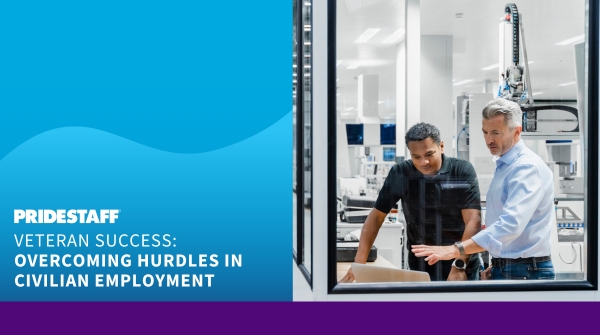Veteran Success: Overcoming Hurdles in Civilian Employment

Transitioning from military service to a civilian workplace is a complex journey. Veterans face a variety of obstacles, including:
- Lack of experience in the civilian workforce.
- Limited access to education and training resources.
- Limited understanding of how to navigate the job market.
- Lack of social support networks that can help veterans find employment opportunities.
The transition can be especially difficult for veterans who have been out of the workforce for an extended period or who are returning to a job market that has changed dramatically since they last worked.
If you’re a veteran looking for civilian employment, you have a wealth of skills, experiences, and qualities that make you highly valuable in the workforce—and with the right support and resources, you can overcome obstacles and find success in your new career.
Here are three common challenges you might face while making the transition to civilian work and strategies for overcoming them:
Translate Military Skills into Civilian Skills
One of the greatest challenges is identifying how the skills gained in military service translate to civilian roles. The struggle begins as early as the first moment a veteran must translate military vernacular into language that recruiters and employers comprehend. Military roles often involve skills commonly used in the civilian work world. For example, soldiers must manage projects, solve logistics problems, and manage personnel. But finding words to describe military codes can be challenging.
Several online tools like the Military Skills Translator can help veterans understand the civilian sector equivalent of their skills or job titles. Similarly, many staffing firms (including PrideStaff!) offer job boards that match veteran skills to civilian career opportunities, making finding great opportunities easy.
Understand and Navigate Civilian Workplace Culture
While military culture is rooted in hierarchy and formal relations, civilian cultures may lean more toward informality and collaboration. Veterans should be ready for this shift and a variety of corporate cultures, each with its unique dynamics. Veterans should also be prepared for the fact that civilian workplaces may not have the same level of structure as military organizations. This lack of structure can be a challenge for veterans who are used to clear lines of authority and accountability. While some may welcome the change, it can also lead to frustration for those who are unprepared for the new dynamic.
Leverage Available Resources
Vocational rehabilitation programs, career counseling, and job fairs specifically for veterans are often available. Networking can play a crucial role in understanding the civilian work sector and finding job opportunities. Mentorship from other veterans who have successfully transitioned (or from professionals in a target industry) can also be invaluable to veteran job seekers.
Find the Right New Career With PrideStaff
Veterans, your skills, discipline, and perseverance are valuable assets in the civilian workforce, and we can connect you with top employers who would be lucky to have you on their team. Our career search for veterans job board can help you find civilian job opportunities to match your military skills using your MOS code, NEC, or AFSC. Talk to your local PrideStaff recruiter to get started today!
Related Posts



